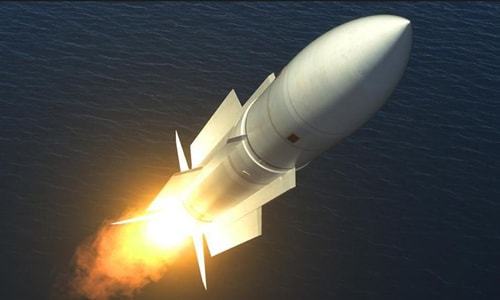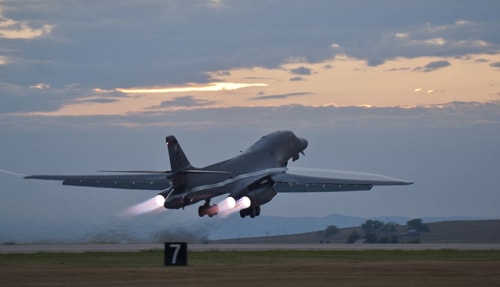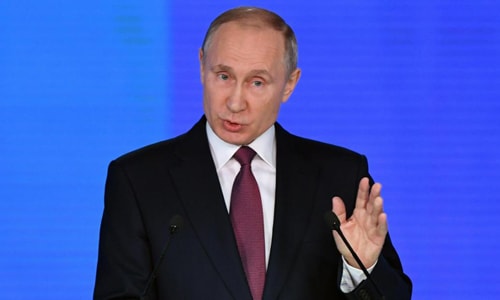Why Putin announced Russia's 'super missile'
Possessing nuclear-powered cruise missiles is seen as Russia's attempt to equalize long-range strike capabilities with the US.
Russian President Vladimir Putin attracted global attention in his state of the nation address last week when he declared that the "super weapons" his country is developing will render US missile defense systems useless.
Most notable in this series of new weapons is the nuclear-powered cruise missile, which Putin asserted has "almost unlimited range" and strong maneuverability to avoid US defense systems to attack from the most unexpected direction, according toWashington Post.
James Cameron, a professor at the University of Fundação Getulio Vargas, Brazil, said that by announcing this "super destructive" weapon, Mr. Putin wants to demonstrate Russia's strategic power to the world, and at the same time show Moscow's efforts to compensate for shortcomings in long-range attack capabilities. However, the features of this type of missile immediately raised doubts among international experts.
Richard Aboulafia, commentator forForbes, said that equipping cruise missiles with nuclear engines is not a new idea, nor is it a good way to increase long-range attack capabilities.
According to him, even a miniaturized nuclear reactor is quite large for a cruise missile, leaving it with very little space to install a guidance system or a large warhead. This can significantly affect the missile's ability to strike accurately, reducing its real power.
These are also single-use nuclear reactors, so the cost of developing the missile is very high, and the price of each weapon unit is also very expensive. In addition, nuclear reactor propulsion technology is still quite new to Russia, so this type of cruise missile will take a long time to be put into service.
According to Aboulafia, Russia will face many difficulties in applying protection measures for the nuclear reactor installed in a cruise missile, causing concerns about the risk of environmental pollution, even nuclear disaster when the reactor explodes with the missile crashing to the target.
Even if such a missile test was successful, it would still cause heavy radioactive contamination in the target area, with serious consequences for the ecosystem. In the event of a missile malfunction during a test launch, Russia would face severe radiation contamination in unexpected areas, possibly turning it into a wasteland.
|
Cruise missiles would be very expensive if equipped with nuclear engines. Illustration:Task and Purpose. |
This expert believes that despite facing many challenges and risks, Russia is still determined to pursue this type of missile because of recent significant advances by the US in long-range attack capabilities, which rely heavily on stealth technology.
The US Air Force currently operates 20 B-2 stealth bombers, each capable of carrying 16 AGM-158 stealth ground-attack missiles. These long-range bombers are also more reliable and cheaper to operate than missiles carrying nuclear reactors that can only be used once.
The US has also embarked on developing the next-generation B-21 strategic stealth bomber, with plans to deploy 100-175 aircraft by 2025, along with new types of stealth aircraft-launched weapons, especially the long-range cruise missile LRSO.
Meanwhile, Russia's current bomber fleet consists of only about 50 Tu-95 aircraft from the 1950s and 12 more modern Tu-160 aircraft, but with a very large radar cross-section, making it difficult to hide from modern enemy reconnaissance systems.
Russia has been trying to develop the PAK-DA stealth bomber for years, but has yet to build a prototype due to major technical and resource challenges. Moscow is believed to still lack the technological foundation needed to build a bomber similar to the US B-2. Instead, the country's military has decided to invest in modernizing the Tu-160, a Cold War-era aircraft. Russia has ordered 10 modernized Tu-160M2s, with plans to complete them by 2023.
|
The Tu-160 is still Russia's main bomber today. Photo:Tass. |
In other words, over the next decade, while the US retires the B-1 and puts into service its second-generation stealth bomber, the Russian air force will still only receive a similar variant of the modernized B-1, while the ambition of a long-range stealth bomber is still quite far away. This reality leaves Russia with no other choice but to develop cruise missiles with global strike capabilities if it wants to maintain its power.
The Russians seem to calculate that new technologies such as nuclear engines or hypersonic glide vehicles will help their air force close the gap with the US and penetrate enemy defenses.
Putin's political calculation
Putin's announcement of the "super weapons" has caused skepticism among international military experts, but has sparked hope among Russians for a bright future of a powerful Russia. This is especially important as the Russian presidential election will take place on March 18, where Putin will compete with seven other candidates to continue his fourth term.
Professor Cameron believes that instead of appearing on television to debate like other candidates, Mr. Putin can take advantage of his federal message to convey positive signals to voters, and nothing can make a stronger impression than Russia's military achievements.
|
Russian President Putin read the federal message on March 1. Photo:Reuters. |
"No one listened to Russia before. But with these military achievements, now the whole world is listening," Mr. Putin asserted in his speech. His statement created an image of a Russia with an increasingly large position on the international stage, consolidated under his leadership after a long period of being defeated by the West.
By unveiling a new cruise missile or nuclear super torpedo, Putin has openly competed with the US in military power in an effort to build confidence and optimism about the future of the Russian people, Cameron said.




